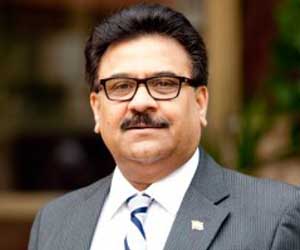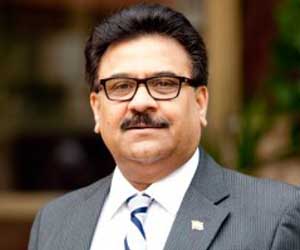 Former diplomat Anil Trigunayat has extensive experience of Africa, having served in Nigeria, C’ote D’Ivoire and Libya. Currently Distinguished Fellow at the VIF, he spoke extensively to StratNews Global’s Ashwin Ahmad, on the situation in Sudan, how the evacuation is being carried out and the role of the Indian embassy in Khartoum, the External Affairs Ministry in Delhi and the armed forces who will undertake the evacuation.
Former diplomat Anil Trigunayat has extensive experience of Africa, having served in Nigeria, C’ote D’Ivoire and Libya. Currently Distinguished Fellow at the VIF, he spoke extensively to StratNews Global’s Ashwin Ahmad, on the situation in Sudan, how the evacuation is being carried out and the role of the Indian embassy in Khartoum, the External Affairs Ministry in Delhi and the armed forces who will undertake the evacuation.
- How does the government prepare for emergencies?
Every Indian embassy has a contingency plan irrespective of the situation on the ground and regardless of the country. These would be updated every year or as when required. These are extensive steps that can be put into action immediately and they often involve the local community as well. So, centres within the community are created locations are identified (in the need for an evacuation process) and the people you are going to reach out to. This is a part of the contingency plan, and this plan is shared with the foreign ministry, so the government knows the situation on the ground. This is done as the priority is to evacuate all the citizens safely and successfully. On the other hand, in Delhi we have something called a ‘Control Room’ which involves the Navy, Army, Air Force and other agencies and various ministries. This is a 24/7 operation and this body coordinates what is to be done. The sending of the two planes to Jeddah and one naval ship to Port Sudan is a case in point. This is standard practice.
- What is the role of the ambassador in a difficult posting?
See, there is a detailed briefing done before the ambassador goes to another country. For instance, I was in Russia, a relatively stable country, before I was transferred to Libya where there are multiple militia groups and as ambassador, I constantly had to keep track of who was siding with whom. This became important when we had to evacuate 140 Indians from Bani Walid which was Gaddafi’s hometown and I rushed to the then Libyan Chief of Army Staff, General Mangoush who though he agreed to help stated frankly that he had little control over the militia there. I then had to contact the various militia, many of whom were local leaders, to persuade them to let the Indians go. This is where the ambassador is important because he is the person on the ground. The government will talk with other countries and international agencies, but the ambassador is the one who has to take the on-the-ground decisions which can be crucial in a crisis situation.
- How is the situation in Sudan?
In Sudan, the situation is complex. The biggest priority is to get Dagalo and Burhan to agree to a ceasefire whereby a humanitarian corridor can be created. India would be familiar with both men since they have been part of the Transition Council since 2019 and since the Indian army has a lot of goodwill with the Sudanese army, having trained a lot of them in the NDC, they will probably be our best bet here. Even if India doesn’t speak directly to Dagalo and Burhan, Indian officers would probably be speaking to Sudanese officers who in turn will be passing messages to the two men. This is of course in conjunction with the bilateral and multilateral efforts that the government would be making.
- How can friendly countries help India?
You have to look at who can help you and who are seen as honest brokers by both sides. The African Union has no role because it suspended Sudan in 2021. India would be looking at nations who would actively be looking to play a role. In Turkey, President Erdogan has promised mediation and among the Gulf nations, Saudi Arabia is playing an active role within the ‘Quad’ which consists of itself, UAE, US, and UK who are trying to broker peace in Sudan. India would also be in talks with the leaders of South Sudan, Kenya and Djibouti who were in Sudan recently to help broker a ceasefire. India has excellent relations with all three nations, and it is likely they would be pushing our case. The other advantage for us is that we are seen as a “neutral” country by both leaders by which I mean a country that does not have a vested interest in interfering in the internal politics of Sudan. So as in the case in Libya, both leaders may be inclined to let Indians go and I think with the ongoing operation that is already happening.
- Coming to the logistics, it is a huge exercise to get people from Khartoum to Port Sudan. How would the government and our diplomats manage this?
Let me be very clear, all the prominent Indians are involved in the contingency plan the government has drafted. The embassy remains in touch with them. If the plan functions properly, there should be a hub and spoke system where you have the leader, co-leader, and group leaders in various parts of the country. They coordinate and communicate information which plays a part in the smooth evacuation of Indians. Big businessmen and company owners are crucial here because they would also have local political contacts and they would also be able to relay messages from the mission to the community at large. The focus would be on keeping the community together through community halls, temples etc. Gurudwaras were especially useful during the 2006 crisis in Lebanon as they could hold large numbers of people and it was easy to feed them. The idea is to be able to hold large numbers of people but be inconspicuous so that place does not become a target as an embassy or UN complex would be.
- Finally, there is concern about the spillover effects of the Sudan war into other fragile African countries such as Chad, CAR, South Sudan, and Ethiopia among others. Could we see other problems there and should India be prepared?
In terms of evacuation, it would not be such a problem. The government would order special flights and take them out. From Africa’s point of view, the ongoing civil war in Sudan is very dangerous. There are currently 400,000 Sudanese refugees in Chad and more are expected to come. This is of course a breeding ground for resentment between the refugees and the local people which could culminate in another conflict.
















